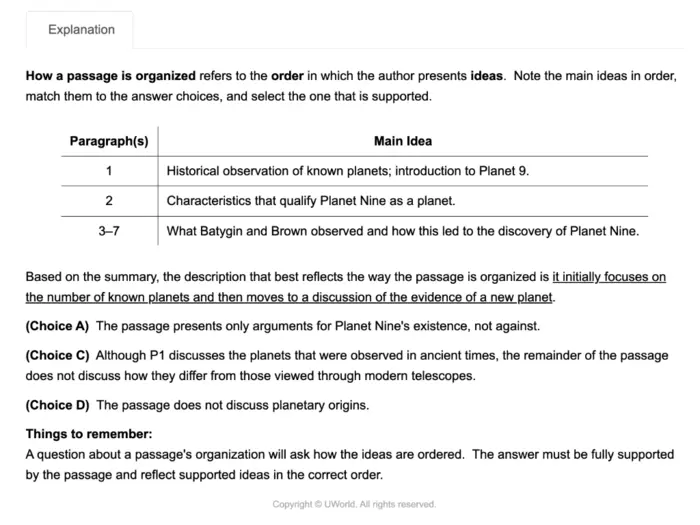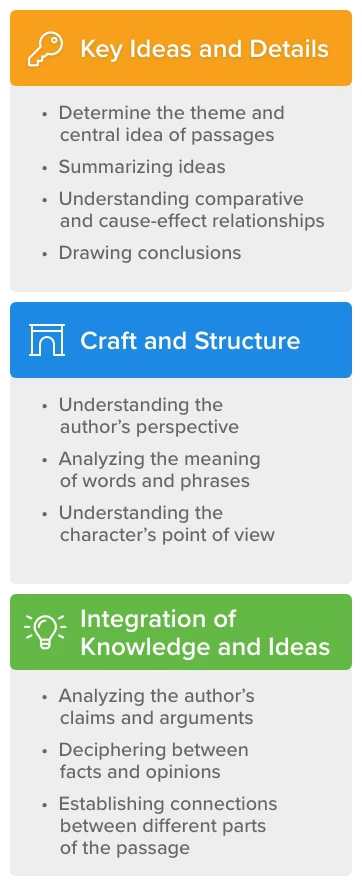The third section of the ACT, the Reading section, assesses your ability to read and reason effectively. You'll read passages similar to those encountered in a college-level setting and answer questions that test your understanding of key ideas, supporting details, cause-and-effect relationships, and the sequence of events. You'll also be asked to compare information and interpret the author's intent, analyze arguments, and synthesize information from multiple texts.
The ACT Reading section measures your ability to:
ACT Reading Format and Tested Content
The Reading section has 40 multiple-choice questions (MCQs) to be answered in 35 minutes, giving you about 52 seconds per question. It features a combination of long passages and paired shorter passages, followed by questions that assess your ability to interpret, analyze, and compare information effectively. To experience this structure firsthand, try our free ACT Reading practice test.
The 4 types of passages that you see in this section are:
Skills Assessed in ACT Reading
The ACT Reading section evaluates a range of reading skills across 3 key domains, as outlined in the official ACT documentation:
-
Key Ideas and Details
This domain includes questions that assess your ability to recognize the main ideas and central themes in a passage, make inferences, and identify relationships such as cause-effect, comparisons, or sequences. It measures your understanding of the literal and implied meaning within paragraphs or the passage as a whole.
-
Craft and Structure
This domain covers rhetorical choices, structure, and vocabulary questions. It tests students’ ability to infer the effects of points of view and word choice; to identify shifts in structure; and to contextually define words and phrases.
-
Integration of Knowledge and Ideas
This domain covers authorial claims, evidence, and multi-text comparison questions. It tests students’ ability to identify the thesis or claim of an author; to evaluate how evidence does or would support claims in a passage; and to consider how 2 separate passages by different authors support, challenge, or respond to one another.
If you are interested in knowing what topics are covered on other ACT subjects, be sure to check out our article on the ACT syllabus.
Is the ACT Reading Section Hard?
The ACT Reading section may appear straightforward, but many students are surprised to learn that it has no defined syllabus. Unlike the Math and English sections, which follow structured content areas, the Reading section focuses on your ability to quickly comprehend and analyze passages — without needing to memorize formulas or grammar rules.
The answer choices can be tricky, often worded to test how closely you’ve understood the passage. With just 35 minutes to complete 40 questions, pacing becomes a challenge, and it’s easy to feel pressed for time.
To succeed, it's important to build strong reading comprehension skills and practice applying them in timed settings. Students who regularly engage with UWorld's ACT self-assessment practice test tend to perform better on test day.
Do the ACT Reading Section Questions Become Progressively Harder as the Test Goes On?
No, the ACT Reading test does not become progressively harder. The biggest challenge students face during this test is reading the passages and answering all the questions within the allotted time.
How to Calculate the ACT Reading Score
The ACT Reading score ranges from 1 to 36 and is determined by converting your raw score into a scaled score. Your raw score is simply the number of questions you answer correctly — there is no penalty for incorrect answers or skipped questions.
Since the Reading section contains 40 questions, the raw score for this section ranges from 0 to 40. After the test, your raw score is converted to a scaled score from 1 to 36 using a score conversion chart. This chart is updated by the ACT each year and may vary slightly between test dates to account for differences in difficulty.
To learn more about how ACT Reading is scored — and how it contributes to your composite ACT score — check out our ACT scoring guide.

What is the Passing Score for the ACT Reading Test?
There is no defined ACT Reading passing score. However, getting a below-average score may not be accepted by many colleges for admission.
What is a Good ACT Reading Score?
A good ACT Reading score can be determined by the average ACT score for a particular year. If you score above average, it can be considered a good score.
What is the Average ACT Reading Score?
The average ACT Reading score changes from year to year depending on the number of students who take the test. In 2024, the average ACT Reading score was 20.2.
What is a Bad ACT Reading Score?
If you score below the average ACT score for a particular year, it may be considered a fairly low score.
ACT Reading Review Tips
Now that you know everything about what is tested on the ACT Reading test, here are some effective strategies to help you perform your best on test day:
-
Identify the passage theme
Reading the introduction or source line can give you quick insight into the passage’s theme and tone. For example, if the passage is related to psychology, you can expect it to be informative and objective.
-
Skim the questions first
Previewing the questions before reading the passage helps you know what to focus on. This approach allows you to spot key information as you read and save time by answering along the way.
-
Use the process of elimination
If all answer choices seem plausible, rely on evidence from the passage. Eliminate choices that aren’t directly supported, and your chances of finding the correct answer improve.
-
Avoid constant switching between the test booklet and answer sheet
Going back and forth between the test booklet and the bubble sheet for every question can be time-consuming. Marking answers on the test booklet first and then filling out the bubble sheet can save you a lot of time.
Before starting your test prep, the most important thing to do is to make a study plan and follow it in a disciplined way. Check out our ACT Reading study guide for tips on how to prepare for this section to get a perfect score. Ultimately, the more you practice, the better you get. UWorld’s ACT Reading practice test offers thousands of exam-like questions to help you achieve your target score. You will also be able to improve on your weak points with our in-depth answer explanations and performance-tracking tools. Looking for a comprehensive study resource? Our ACT Question Bank includes expertly designed questions with detailed explanations to help you master every section of the exam.

References
- ACT.org. (2024). National ranks for English, math, reading, science, composite, and STEM scores (2024). Retrieved April 02, 2025, from https://www.act.org/content/act/en/products-and-services/the-act/scores/national-ranks.html
- ACT.org. (n.d.). Description of the reading test. Retrieved April 03, 2025, from https://www.act.org/content/act/en/products-and-services/the-act/test-preparation/description-of-reading-test.html
Read More Articles
If you are preparing for the ACT Math test, then this is the guide for you! Read about the ACT Math format, syllabus, question types, scoring pattern, and more.
About ACT ScienceTrying to figure out what is on the ACT Science section? Here is everything you need to prepare for this test, including the difficulty level of questions and scoring pattern.
About ACT EnglishThinking about what is tested on ACT English? Our all-in-1 guide will help you with the test format, syllabus, topics, scoring, and tips to approach this section.
ACT Reading Practice Questions & TestsSharpen your test-taking skills and skyrocket your scores with our expert-developed ACT Reading practice materials that mirror the actual test! Start your prep today!





